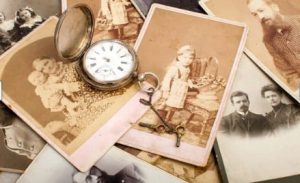 A long line of generations is behind every person.
A long line of generations is behind every person.
Your father gave you half of your physical, spiritual and intellectual characteristics, your mother the other half. But your father embodied the inheritance of his two parents, your mother that of hers. You see that the number of your ancestors doubles with each generation. Ten generations back, it is already 1028.
Since the average age difference between parents and children is about 30 years, you can calculate that you carry the inheritance of 1,024 people who lived 300 years ago, in the year 1725. These ancestors passed their inheritance down through the generations until it reached your two parents. Altogether, the number of your ancestors from 1725 down to today is 2,046.
But each person living in 1725 had just as many ancestors. If you go back 600 years instead of 300, to the year 1425, the number grows dramatically. By then, you would have 1,048,576 ancestors in that generation alone, and a total of 2,097,150 across all 20 generations. This vast lineage reminds us how deeply connected we are to the past.
The number is correct, but it is important to realize that all are not distinct people. In each family tree, there are cases in which a man marries a woman to whom he is distantly related, perhaps sharing a great grandfather. This man and woman, as well as their child, share the same ancestors from the great grandfather back. This is termed diminishing ancestors, since it significantly reduces the number of ancestors. This does not mean a loss of genetic material, but rather a doubling of the same or similar genes that can be either favorable or unfavorable.
Despite the diminished number of ancestors, their number is still in the millions. Now you understand what the poet C. S. Meyer meant:
“We dead, we dead are a vaster army
Than those on land, than those at sea!…
And all our loves and hates and strifes
Still flow above us in mortal veins.”
You are not in the world by accident, but rather are the creation of millions of people, a creature whose blood flows from thousands of sources.
If you reflect on this, the events of history of our white race will take on an entirely new meaning for you. Was not one of your ancestors a serf during the Thirty Years War, one of those oppressed farmers who fought for their rights in the farmer’s wars, one of the pious heroes were persecuted because of their beliefs, one of the knights who crossed the Alps with the Great Emperor? Or could one of your ancestors been the great Queen Victoria or Moses, Abraham, Sara? Most certainly. The images and the history expand the longer you think about it. Put another way:
The history of your people is your own history.
You sense the honor you owe your ancestors. Now you understand the holy treasure of your own life, your own body, your own soul.
Build a genealogical table and write down everything that you can learn about your parents, grandparents, great grandparents and beyond. You will immediately see its significance for your own life.
If your genealogical table shows evidence of a particular gift or valuable trait, see if you also have it, and help it to develop.
“Make what you have inherited from your fathers and mothers your own.” Only through effort does a capacity become a virtue, a gift, an ability.
If you have grown up under unfavorable conditions, do not give up. Read the biographies of great men and women and you will see that valuable inheritances overcome privation and poverty when a firm will allows them to develop.
Your inheritance is more substantial than the environment. But what is ultimately decisive is your will.
Your will is your most valuable possession.
Not only have good genes been passed down to you from your many ancestors. Look fate in the eye and understand that, too!
Become aware of the bad characteristics, the evil desires, that dwell within you. Look not only for the virtues of your ancestors, but also their weaknesses. When you understand the bad characteristics of your ancestors, you will better understand how to exert your will.
Your respect for your ancestors will not suffer. You are not responsible for what you have inherited.
You are, however, responsible for what you do with those traits.
What is true of bad traits and character weaknesses is equally true for the weaknesses of the body and for physical illnesses. Please do not neglect to find out the illnesses of your ancestors and the causes of their deaths. You may find that particular illnesses are common in your ancestry. You will then be able to guard against them by taking care of your body and by hardening and strengthening it through intelligent exercise.
Never forget that you may not give up — for to repeat — your will is your most valuable possession.
They have gone before us —
But we, blood of their blood
Want to be true to our inheritance
Until our dust rests with theirs
